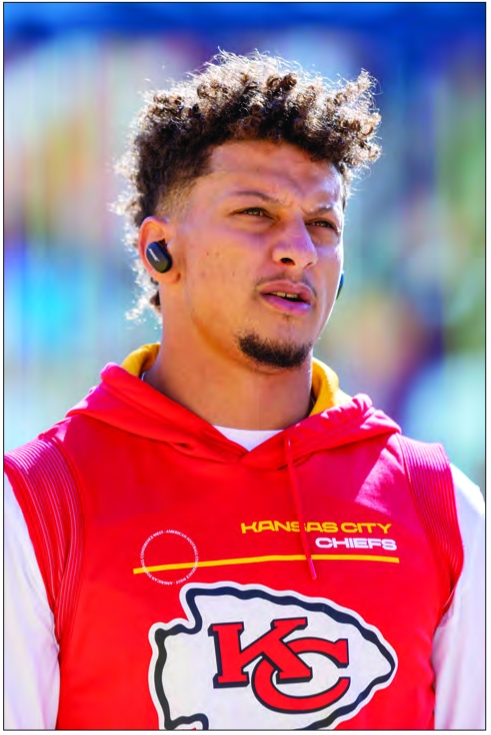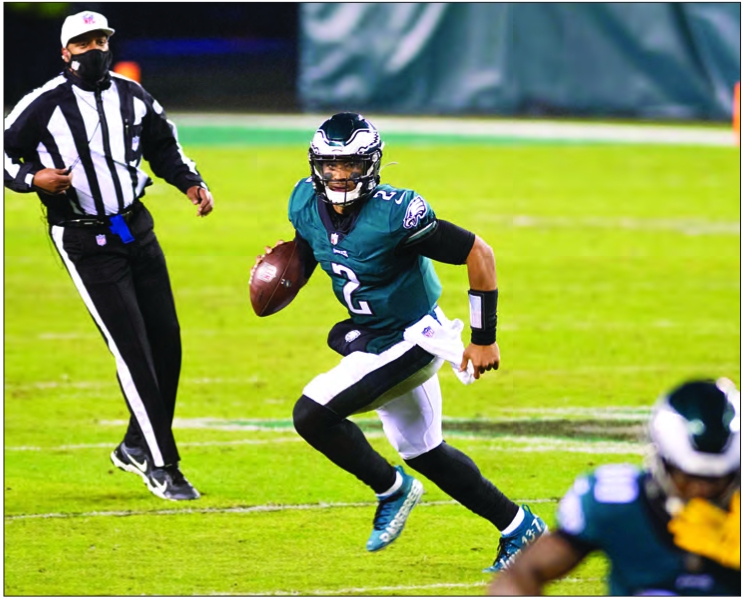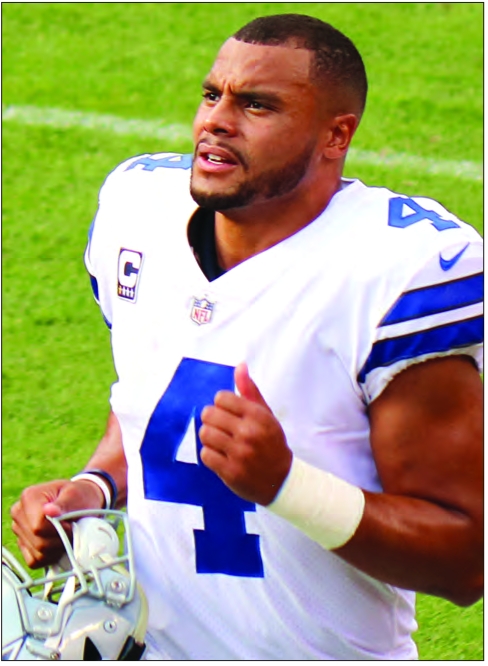
Patrick Mahomes, Kansas City Chiefs
Jalen Hurts, Philadelphia Eagles

Dak Prescott, Dallas Cowboys
Once a ‘whites only’ position, 15 starting QBs of color in league today
The current list of Black men playing the cherished position of quarterback in the National Football League is one of distinction. Currently there are 15 starting quarterbacks of color in the NFL. At the top of the list is Patrick Mahomes, a three-time Super Bowl champion signal caller who is attempting to lead his two-time defending champion Kansas City Chiefs to an unprecedented threepeat — something that has never been done in NFL history.
Chasing such a lofty goal is a daunting task, even for someone as talented as Mahomes. But he has already publicly said, “My team is going to pull off the three-peat.” Bold words to live up to, but Mahomes feels comfortable putting the challenge out there for all the other teams in the NFL. He added, “We have the chance to be the first NFL team to ever win three straight Super Bowl titles. That would put us in a class all by ourselves. And that is a challenge that my teammates and I are willing to take on.”
The
list of young Black quarterbacks willing to accept the Mahomes
challenge include Heisman Trophy winners Lamar Jackson of the Baltimore
Ravens and Kyler Murray of the Arizona Cardinals, Caleb Williams of the
Chicago Bears, and Jaylen Daniels of the Washington Commanders, who won
the award last year. Bryce Young of the Carolina Panthers, a 2021
Heisman trophy winner at Alabama, was recently demoted from his starting
spot with the Carolina Panthers.
The
rest of the group is as varied as their skill level. Jacoby Brissett of
the New England Patriots and Tua Tagaviloa of the Miami Dolphins
represent the AFC East. Jalen Hurts of the Philadelphia Eagles and Dak
Prescott of the Dallas Cowboys are in the NFC
East. Deshawn Watson of the Cleveland Browns and Justin Fields of the
Pittsburgh Steelers join Lamar Jackson in the AFC North. C.J. Stroud of
the Houston Texans and Anthony Richardson of the Indianapolis Colts are
in the AFC South. Jordan Love of the Green Bay Packers is in the NFC
North while Geno Smith of the Seattle Seahawks is out west. Among this
group, rookies Williams and Daniels enter their rookie campaigns as the
No. 1 and No. 2 picks of the college football draft — a first in
National Football League history.
They paved the way
There
are other Black men who have played quarterback in the NFL since Fritz
Pollard became the first African American player/owner back in the
1920s. Men like Warren Moon of the Houston Oilers and Steve McNair of
the Tennessee Titans put together Hall of Fame resumes while advancing
the Black quarterback movement.
Moon
was a magnificent talent who had to excel in the Canadian Football
League (Grey Cup Championships with the Edmonton Eskimos) before he got
his chance to play in the NFL. “I had to go to Canada to be able to play
quarterback,” he said. “After winning Grey Cup titles and Most Valuable
Player awards, I had proven to a lot of doubters that I was the real
deal.
But it was never an easy journey.”
The
same can be said for the late Steve McNair, who quarterbacked the
Titans to a near-upset of the St. Louis Rams in Super Bowl XXXIV. His
dramatic last-minute drive, which ended up at the Rams oneyard line, is
still considered one of the great moments in Super Bowl lore. Add to
that the last-minute name of Cam Newton, the 2010 Heisman Trophy winner
at Auburn, who won the NFL MVP Award while leading his Carolina Panthers
team to a 15-1 record, before losing to Hall of Fame quarterback Peyton
Manning and the Denver Broncos in Super Bowl No. 50, and one can see
that, when given a legitimate chance, Black men can lead NFL teams from
the hallowed quarterback position.
Shifting to the present day, we find that the
principal reason for the influx of Black men playing the quarterback
position in the NFL is the game has evolved over the last decade. Gone
are the days of the rigid, stand in the pocket quarterbacks who cannot
avoid the speed of on-rushing defensive players. The consensus of NFL
coaches is today’s quarterbacks have to be athletic and possess the
ability to escape the pass rush and buy time to make plays down the
field.
This is a long
distance from the thinking of decades past when Black men were steered
away from thinking that they could play the No. 1 position on the
football field. Stereotypical thinking, such as Blacks are not smart
enough to play quarterback, kept the quarterback position an all-white
affair during the growth decades of the 1950s and ’60s.
That
history is littered with the shattered dreams of men like Jefferson
Street and Joe Gilliam of the 1970s Pittsburgh Steelers.
As
a young reporter, I became aware of Gilliam’s situation. He was named
the starting quarterback for the Steelers over a struggling Terry
Bradshaw and led the team to a 4-1-1 record in their first Super Bowl
winning season. His life fell apart when he was benched in favor of
Bradshaw. He drifted to drugs and died in 2000 a brokenhearted man. He
was given a chance, succeeded and still lost his job.
Years
earlier, Marlin Briscoe crashed the sports headlines when he was named
the starting quarterback for the Denver Broncos, the first Black man to
be named a starter for an NFL franchise. But his stint as a starter was
short-lived.
Doug
Williams’s landmark performance in Super Bowl XXII forever destroyed the
myth that Black men could not play quarterback. His record setting
passing day in his Washington Redskins’ 42-10 crushing of the Broncos,
despite playing on a seriously injured knee, followed two Super Bowl
victories by another man of color, Jim Plunkett of the Oakland Raiders
in 1981 and 1984. Both men were strongarmed stand-in-the-pocket
quarterbacks, a far cry from today’s mobile Black signal callers.
But
they are owed a debt of gratitude for opening the door to the
mega-million-dollar contracts being offered to Patrick Mahomes, Lamar
Jackson, Jordan Love, Tua Tagaviloa and the rest of the current class of
Black quarterbacks. During a past interview with Doug Williams, he said
he was proud to be a pioneer for today’s young Black quarterbacks. They
should tip their heads in respect whenever his name is spoken.